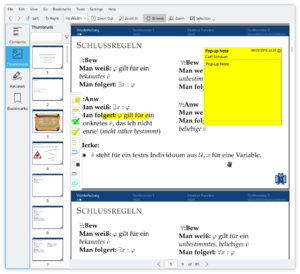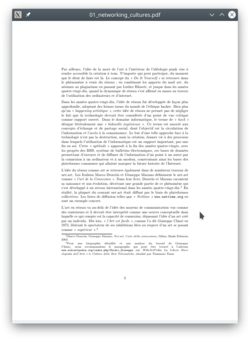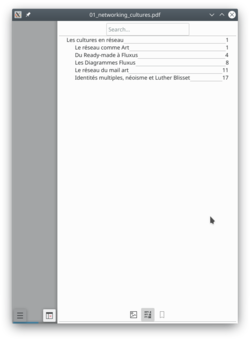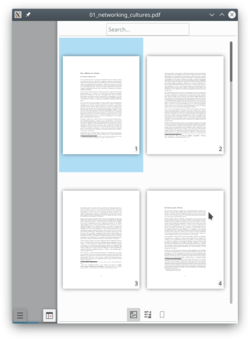Okular/pt-br: Difference between revisions
(Updating to match new version of source page) |
(Updating to match new version of source page) |
||
| Line 8: | Line 8: | ||
==Contexto== | ==Contexto== | ||
Its development began as part of Google's Summer of Code program. The description of the project can be found at [https://web.archive.org/web/20080921165821/https://developer.kde.org/summerofcode/okular.html KDE Developer's Corner]. | |||
O Okular combina as excelentes funcionalidades do [[Special:myLanguage/KPDF|KPDF]], com a versatilidade de suportar diferentes tipos de documentos, tais como PDF, Postscript, DjVu, CHM, e outros. | O Okular combina as excelentes funcionalidades do [[Special:myLanguage/KPDF|KPDF]], com a versatilidade de suportar diferentes tipos de documentos, tais como PDF, Postscript, DjVu, CHM, e outros. | ||
| Line 25: | Line 25: | ||
== Mobile Version == | == Mobile Version == | ||
Okular has a mobile version since version 0.16 release in February 2013 <ref>[https://okular.kde.org/news.php Release information]</ref>. The first version was based on the [https://community.kde.org/Plasma/Active active] framework. The mobile viewer was then ported to Kirigami in 2016 by Marco Martin<ref>[https://phabricator.kde.org/R223:eb1f73800e83b11e4a5ae93ac069893aa88f0eaa | Okular has a mobile version since version 0.16 release in February 2013 <ref>[https://okular.kde.org/news.php Release information]</ref>. The first version was based on the [https://community.kde.org/Plasma/Active active] framework. The mobile viewer was then ported to Kirigami in 2016 by Marco Martin<ref>[https://phabricator.kde.org/R223:eb1f73800e83b11e4a5ae93ac069893aa88f0eaa Commit port mobile version from plasma-framework to kirigami]</ref> and finally to Kirigami2 in 2017<ref>[https://phabricator.kde.org/R223:caf8820cf773316ce41d9a8c1f7357b3ffc3ef86 Commit port mobile version from kirigami to kirigami2]</ref>. | ||
The mobile version doesn't support all features | The mobile version doesn't support all features from the desktop version, but provide better touch support and a mobile interface. | ||
[[File:Okular_mobile_pdf_view.png|250px]] | [[File:Okular_mobile_pdf_view.png|250px]] | ||
| Line 50: | Line 50: | ||
By default, Okular follow the PDF specification and don't allow copying text from DRM protected files. However, there is an option in the settings to disable DRM limitations in <menuchoice>Settings -> General -> Program Features -> Obey DRM limitations</menuchoice> | By default, Okular follow the PDF specification and don't allow copying text from DRM protected files. However, there is an option in the settings to disable DRM limitations in <menuchoice>Settings -> General -> Program Features -> Obey DRM limitations</menuchoice> | ||
There was a small controversy in the Debian bug tracker a long time ago, about the default choice to Obey DRM limitations<ref>[https://lists.debian.org/debian-devel/2009/05/msg00879.html DRM and Okular in Debian bug tracker]</ref><ref>[https://lwn.net/Articles/335415/ DRM and Okular in LWM]</ref>. | There was a small controversy in the Debian bug tracker a long time ago, about the default choice to Obey DRM limitations<ref>[https://lists.debian.org/debian-devel/2009/05/msg00879.html DRM and Okular in Debian bug tracker]</ref><ref>[https://lwn.net/Articles/335415/ DRM and Okular in LWM]</ref>. The choice was then [https://tsdgeos.blogspot.com/2009/06/okular-pdf-and-drm.html explained] by an Okular/KPdf developer<ref>[https://tsdgeos.blogspot.com/2009/06/okular-pdf-and-drm.html Okular, PDF and file permissions]</ref>. | ||
=== PDF Signature and certificate === | === PDF Signature and certificate === | ||
Okular can verify if a PDF certificate is valid. But you can not yet create new signature. See [https://tsdgeos.blogspot.com/2019/01/okular-pdf-signature-certificate.html release note] for more information. | Okular can verify if a PDF certificate is valid. But you can not yet create a new signature. See [https://tsdgeos.blogspot.com/2019/01/okular-pdf-signature-certificate.html release note] for more information. | ||
== More Information == | == More Information == | ||
Revision as of 21:00, 3 February 2019
O que é Okular?
O Okular é um visualizador de documentos universal desenvolvido pelo KDE. O Okular funciona em várias plataformas, incluindo, entre outras, Linux, Windows, Mac OS X, * BSD, etc.
Você pode acompanhar o desenvolvimento na página web do projeto.
Contexto
Its development began as part of Google's Summer of Code program. The description of the project can be found at KDE Developer's Corner.
O Okular combina as excelentes funcionalidades do KPDF, com a versatilidade de suportar diferentes tipos de documentos, tais como PDF, Postscript, DjVu, CHM, e outros.
A página de formatos de documentos compatíveis tem um gráfico que descreve com mais detalhes os formatos suportados e as funcionalidades já implementadas em cada um deles.

Além de trabalhar com diversos formatos, o Okular oferece recursos como seleção de texto, anotação, extração de arquivos incorporados em um documento, e muitas outras surpresas. Imagens do Okular em ação podem ser vistas aqui.
Você pode falar com os desenvolvedores e outros usuários no IRC, irc.freenode.org, canal #okular.
Se você estiver interessado em contribuir com o Okular, por favor, entre em contate a equipe. Programadores e não codificadores são igualmente bem-vindos.
Mobile Version
Okular has a mobile version since version 0.16 release in February 2013 [1]. The first version was based on the active framework. The mobile viewer was then ported to Kirigami in 2016 by Marco Martin[2] and finally to Kirigami2 in 2017[3].
The mobile version doesn't support all features from the desktop version, but provide better touch support and a mobile interface.
You can test the mobile version in your PC by entering
okularkirigami
in your terminal.
Dicas e Sugestões
Revisando documentos / Anotações
Um clique duplo nas ferramentas de Revisão (F6) permite que você faça várias anotações sem ter que reativar a ferramenta após a primeira vez.
Como manter as anotações feitas no arquivo PDF:
Por padrão, o Okular salva anotações no diretório de dados local para cada usuário. Desde o KDE 4.9, é opcionalmente possível armazená-los diretamente em um arquivo PDF escolhendo , para que possam ser vistos em outros visualizadores de PDF. Observe que esse recurso requer o Poppler 0,20 ou mais recente para documentos PDF comuns. Se o documento PDF que você está anotando estiver criptografado, esse recurso exigirá o Poppler 0.22 ou mais recente.
DRM
By default, Okular follow the PDF specification and don't allow copying text from DRM protected files. However, there is an option in the settings to disable DRM limitations in
There was a small controversy in the Debian bug tracker a long time ago, about the default choice to Obey DRM limitations[4][5]. The choice was then explained by an Okular/KPdf developer[6].
PDF Signature and certificate
Okular can verify if a PDF certificate is valid. But you can not yet create a new signature. See release note for more information.
More Information
- Official KDE documentation
- Okular website
- Okular API documentation
- Okular phabricator project
- Okular git repository



